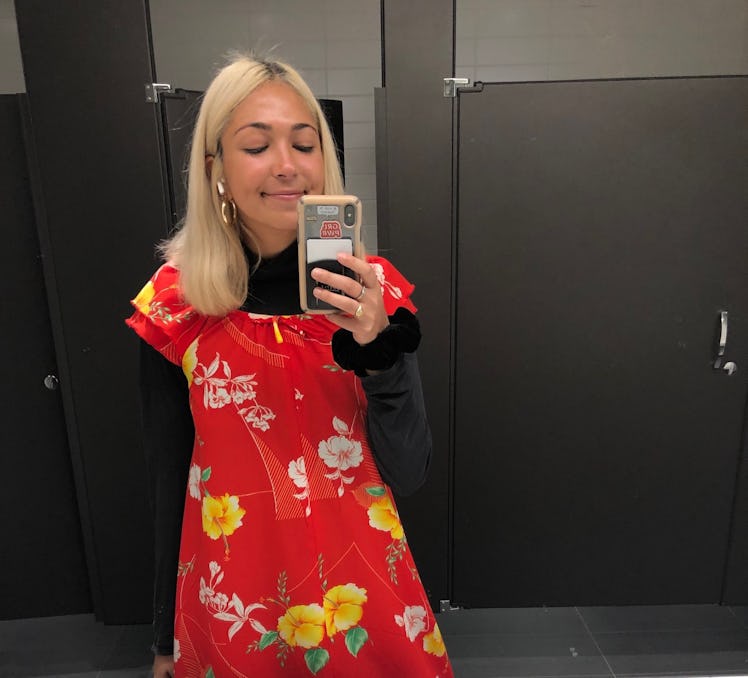
An Expert Helped Me Figure Out Why I'm Afraid Of Conflict & It Changed My Life
I have something to confess: I have deceived you all. I, Iman Hariri-Kia, am a total hypocrite. So, this year I'm setting a 2019 dating goal, so that I — and all of you — can hold myself accountable. You see, as a Sex and Dating Editor, I spend a lot of my time reading about, editing pieces on, and writing stories exploring the world of dating, which often boils down to the same core principles. For example, "When in doubt, communicate," is a cornerstone. Or, "All strong relationships are built on a foundation of mutual respect," is a classic. "Fighting is healthy," is a no-brainer. And yet, I often struggle to take my own advice — especially as it pertains to the latter.
The truth is, when sh*t hits the fan, my first instinct isn't to talk it out or take a deep breath — instead, I cry. I can't help it. The second my partner and I are having a heated conversation and vocal tones begin to elevate, I can feel my eyes watering faster than a viral meme. I can anticipate that our tempers are about to erupt, so my emotions butt in and I bawl like a baby until the moment passes. Then, I dismiss the incident as a one-off, a minor argument. I try to make my partner promise that we'll never have a spat, ever again.
I know this is unhealthy. I've been told this unhealthy. I tell people this is unhealthy all the freaking time! But the truth is, fighting scares me. I'm an extremely conflict-averse person, which I think is a product of being an incredibly loyal person. I tend to thrive off of incurring happiness for those I love. I live for the hunky-dory. So, when I do fight with the people in my life, the disagreements often have consequences. Throughout my 20-some years on this planet, fighting has led to people leaving, from a broken friendship to a family feud. In my mind, arguments can make way for abandonment, and can sometimes act as a scapegoat for larger problems — an excuse to give up when the tides get rough.
So why do I harbor this anxiety? Miriam Kirmayer, a licensed therapist, explained to The Every Girl that my fear of conflict is more common than I previously realized. "We all differ in our predisposition to experience and express difficult emotions, as well as our stress response to situations we perceive as threatening," Kirmayer said. "our past experiences can impact how comfortable we are expressing our needs and how open we are to hearing someone else out. These experiences can also shape the beliefs we have about conflict itself, which impacts our willingness to engage in conversations we might perceive as threatening."
So, maybe my fear of fighting is actually rooted in a different phobia entirely — the fear of being left alone. Moreover, if a preventable fight causes the rupture of my relationship, perhaps I'm worried that I'll never be able to forgive myself for allowing it to happen. This anxiety — not the actual fight itself — might be what has been driving me to tears for all these years.
Striving for an unattainable perfection is exhausting, and I'm ready to let it go.
How do I combat this anxiety and meet conflict head-on? Kirmayer recommends identifying my ideas and questions about conflict and addressing directly with my partner. By opening up an honest dialogue about the outcomes of fighting that fill me with fear, perhaps my load will be left a little bit lighter. Having a conversation with my partner about the IRL consequences of getting into a fight might require a lot of vulnerability, but could help alleviate some of the pain and stress. A one-sided argument with yourself often gets you nowhere.
Dr. Joshua Klapow, clinical psychologist and host of the Kurre and Klapow radio show agrees with this methodology. "Bring up points of contention gently and calmly as to not trigger reactive emotions," he tells Elite Daily. "You're not a mind reader. Talk about how you feel and what you think, without making assumptions about what your partner feels or thinks."
After our last little kerfuffle, my partner held me tightly as I sobbed into his shoulder. The argument was over, and yet, I couldn't stop crying. "It was just a fight," he told me. Just a fight? It wasn't the fight in itself that scared me, it was what fighting could suggest — that our relationship wasn't perfect; that we had problems. But striving for an unattainable perfection is exhausting, and I'm ready to let it go. This year, I want to feel more comfortable with discomfort. I hope to aim for healthy, instead of an unachievable level of flawlessness.
This relationship goal requires faith — the trust that I must place in my partner that a disagreement doesn't mean an end-all-be-all, that a fight really can be just a fight. I have found that when you love someone, you love them in their totality, not for their highs and their lows. That's truly the way in which I love my partner, but for some reason, I have always struggled to believe that that's how someone could love me. So above all, I hope that this year brings me one step closer to truly believing that I am worthy of that kind of unconditional love — the kind that overcomes the odds and surpasses slammed doors.